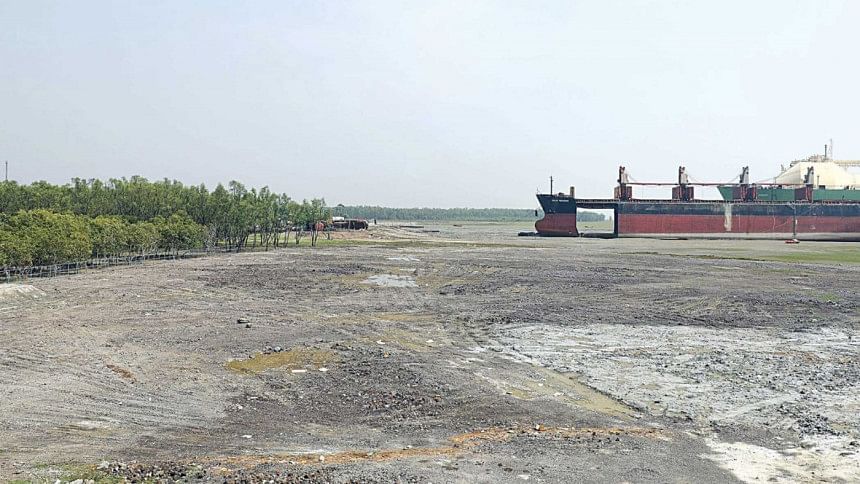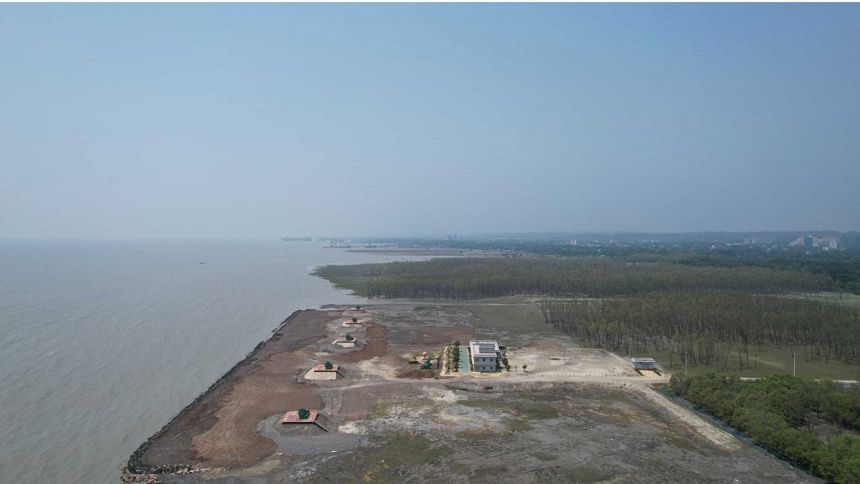Hope to revive a forest dashed

As many as 5,000 trees weren't spared the axe in a five-acre forest area in Tulatoli of Chattogram. This lush-green forest was turned into a shipbreaking yard.
The Forest Department, however, wasn't about to go down without a fight. They challenged the legality of the land lease agreement signed in February 2022 between the district administration and Kohinoor Steel, the owner firm of the yard.
The land used to be a "notified" forest area according to Section-4 of the Forest Act-1986, meaning the district authorities could not lease it out to a private entity without consulting the Forest Department first, it claimed.

The place was part of a 400-acre mangrove forest developed by the Coastal Forest Division in 1983-1984 to protect the locality from natural disasters, the officials added.
The Forest Department also challenged the yard authorities and filed three cases against them for felling trees without permission.
Felling trees without permission from the Forest Department is illegal under the Forest Products Transit Rules-2011.
Responding to the call of the Forest Department, the district administration, by the order of the deputy commissioner, cancelled the lease agreement in 2023 and sealed off the yard.
A glimmer of hope for the forest's revival was seen. But that hope has been short-lived.
The divisional commissioner has overruled the order last month, reinstating the lease agreement and paving the way for the shipbreaking yard to move full steam ahead.
This decision deals a devastating blow to efforts to restore the lost forest, according to the forest department and environmentalists.
Visiting the area recently, this correspondent found that the yard authorities cordoned off a large area with wire fencing, while some workers were constructing a brick wall.
"The district administration cancelled the lease illegally. Later, we appealed to the higher authorities and they ordered the district administration to reinstate the lease," said Abul Kashem alias Raja Kashem, owner of Kohinoor Steel.
Contacted, Tofayel Ahmed, divisional commissioner of Chattogram, confirmed that they ordered to reinstate the lease after inspecting related documents.
"We found proper grounds for ordering to reinstate the lease contract after inspecting all the relevant documents. The decision was made after holding a hearing in presence of both parties," Tofayel said.
Shahadat Hossain, the then Sitakunda upazila nirbahi officer who had signed the lease agreement on behalf of the district administration, claimed that the land to be recorded under the district administration.
"We informed the Forest Department before leasing out the land, but they didn't respond," he said.
Abdur Rahman, the then divisional forest officer of Chattogram Coastal Forest Division, however, said, "The district administration leased out the forest land to Kohinoor Steel without informing us."
Belayet Hossain, incumbent divisional forest officer of Chattogram Coastal Forest Division, said, "No one can lease out notified forest without obtaining permission from the Forest Department."
He informed them that they formed a committee to take the matter to court.
Yard owner Abul Kashem stressed that no one can hinder his business.
"I have already invested several crores of taka to build the shipbreaking yard. I am trying to bring a scrap vessel to the yard soon for dismantling," he added.
THE ENVIRONMENTAL COSTS
If the yard becomes fully functional, felling of 5,000 trees won't be the last of the environmental harm.
Shipbreaking, particularly when conducted on tidal mudflats in South Asia, causes severe environmental pollution and health hazards for workers, according to NGO Shipbreaking Platform.
Toxic spills from shipbreaking operations contaminate coastal ecosystems and devastate local communities dependent on them, it added.
Lack of proper waste management results in hazardous materials being dumped on beaches, leading to soil contamination and metal accumulation. Besides, pollutants spread through currents and tides, harming marine biodiversity, destroying fishing livelihoods, and endangering mangrove ecosystems.

 For all latest news, follow The Daily Star's Google News channel.
For all latest news, follow The Daily Star's Google News channel. 



Comments